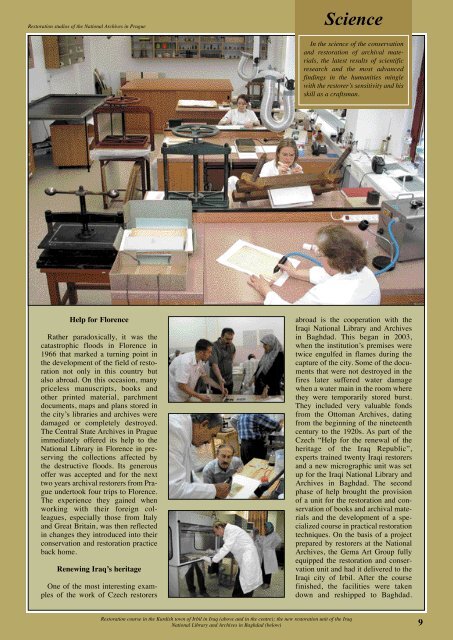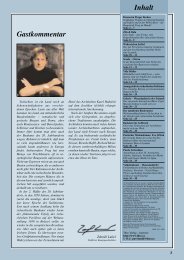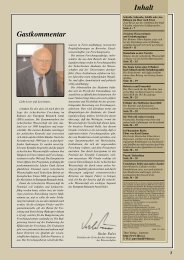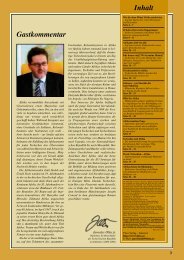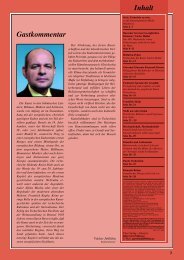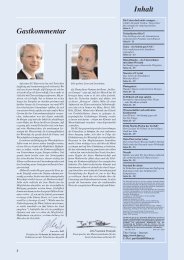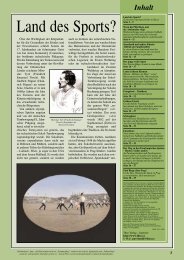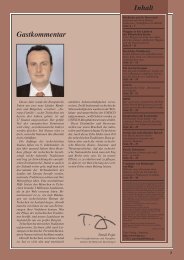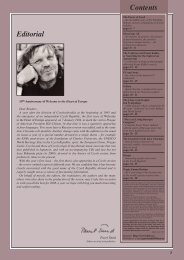Editorial Contents - THEO publishers
Editorial Contents - THEO publishers
Editorial Contents - THEO publishers
You also want an ePaper? Increase the reach of your titles
YUMPU automatically turns print PDFs into web optimized ePapers that Google loves.
Restoration studios of the National Archives in Prague<br />
Help for Florence<br />
Rather paradoxically, it was the<br />
catastrophic floods in Florence in<br />
1966 that marked a turning point in<br />
the development of the field of restoration<br />
not only in this country but<br />
also abroad. On this occasion, many<br />
priceless manuscripts, books and<br />
other printed material, parchment<br />
documents, maps and plans stored in<br />
the city’s libraries and archives were<br />
damaged or completely destroyed.<br />
The Central State Archives in Prague<br />
immediately offered its help to the<br />
National Library in Florence in preserving<br />
the collections affected by<br />
the destructive floods. Its generous<br />
offer was accepted and for the next<br />
two years archival restorers from Prague<br />
undertook four trips to Florence.<br />
The experience they gained when<br />
working with their foreign colleagues,<br />
especially those from Italy<br />
and Great Britain, was then reflected<br />
in changes they introduced into their<br />
conservation and restoration practice<br />
back home.<br />
Renewing Iraq’s heritage<br />
One of the most interesting examples<br />
of the work of Czech restorers<br />
Restoration course in the Kurdish town of Irbil in Iraq (above and in the centre); the new restoration unit of the Iraq<br />
National Library and Archives in Baghdad (below)<br />
Science<br />
In the science of the conservation<br />
and restoration of archival materials,<br />
the latest results of scientific<br />
research and the most advanced<br />
findings in the humanities mingle<br />
with the restorer’s sensitivity and his<br />
skill as a craftsman.<br />
abroad is the cooperation with the<br />
Iraqi National Library and Archives<br />
in Baghdad. This began in 2003,<br />
when the institution’s premises were<br />
twice engulfed in flames during the<br />
capture of the city. Some of the documents<br />
that were not destroyed in the<br />
fires later suffered water damage<br />
when a water main in the room where<br />
they were temporarily stored burst.<br />
They included very valuable fonds<br />
from the Ottoman Archives, dating<br />
from the beginning of the nineteenth<br />
century to the 1920s. As part of the<br />
Czech “Help for the renewal of the<br />
heritage of the Iraq Republic”,<br />
experts trained twenty Iraqi restorers<br />
and a new micrographic unit was set<br />
up for the Iraqi National Library and<br />
Archives in Baghdad. The second<br />
phase of help brought the provision<br />
of a unit for the restoration and conservation<br />
of books and archival materials<br />
and the development of a specialized<br />
course in practical restoration<br />
techniques. On the basis of a project<br />
prepared by restorers at the National<br />
Archives, the Gema Art Group fully<br />
equipped the restoration and conservation<br />
unit and had it delivered to the<br />
Iraqi city of Irbil. After the course<br />
finished, the facilities were taken<br />
down and reshipped to Baghdad.<br />
9


